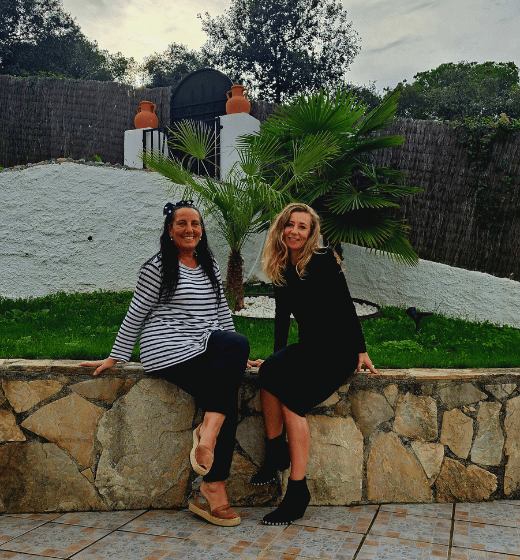

I’m thrilled to introduce you to Jeanette, a mid-40s professional from Hungary who now lives in Valencia, Spain. Jeanette’s journey began with me years ago in London, where she first studied Spanish under my guidance.
Her life took her from the UK to Spain, in the beautiful city of Valencia, but her desire to take her Spanish—especially business Spanish—to the next level led her to a homestay immersion here in Barcelona, Dosrius.
Over the course of her stay, she not only improved her language skills but also formed deeper connections and created new memories she’ll cherish for years to come.
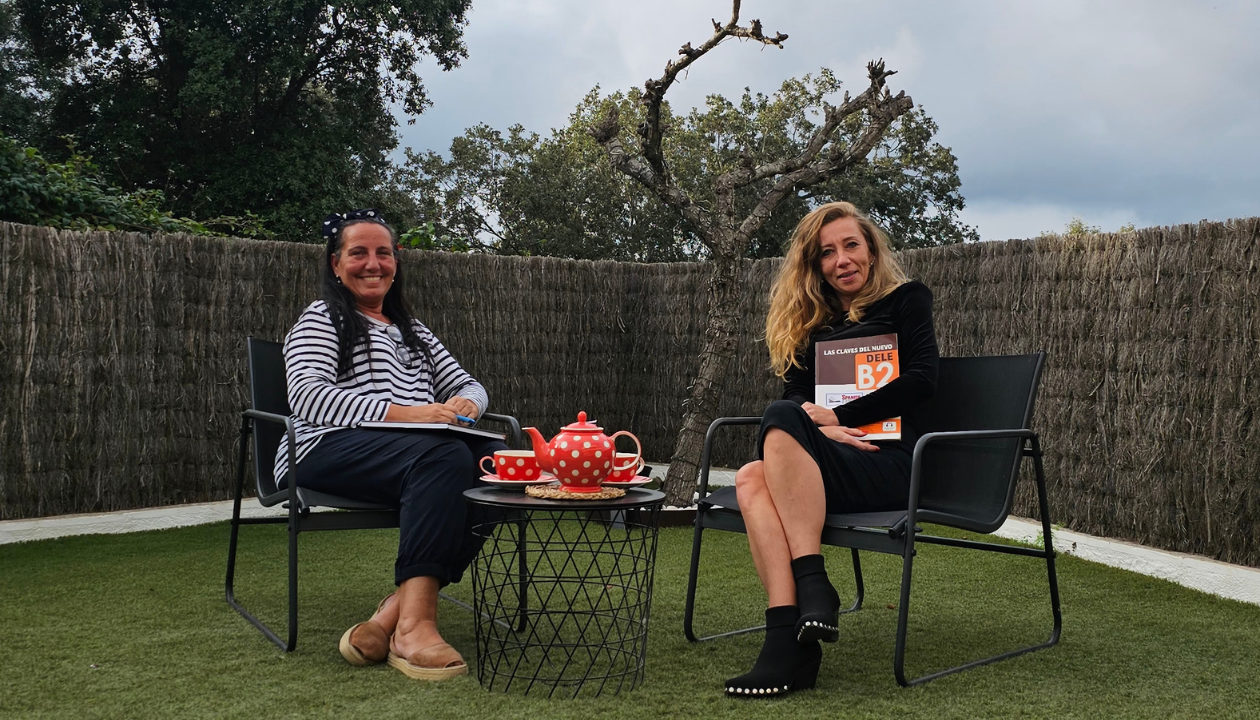
1. The Road from London to Valencia
Jeanette’s story is one of growth and transition. She first moved from Hungary to the UK, where she began learning Spanish with me in London. Inspired by her experience with Spanish lessons, she continued practicing with native Spanish speakers. When a career opportunity brought her to Valencia, she was able to practice Spanish on a daily basis.
Yet, she realized that to truly excel—particularly in professional settings—she needed a more intensive, hands-on experience. She considered joining a Spanish language school or enrolling in intensive Spanish courses, but she wanted something immersive.
Her decision to come to Barcelona, Dosrius for a Spanish Homestay Immersion Program (SHIP) was fueled by the desire to refine her language proficiency, ensuring she could handle everything from casual conversations to high-level business negotiations.
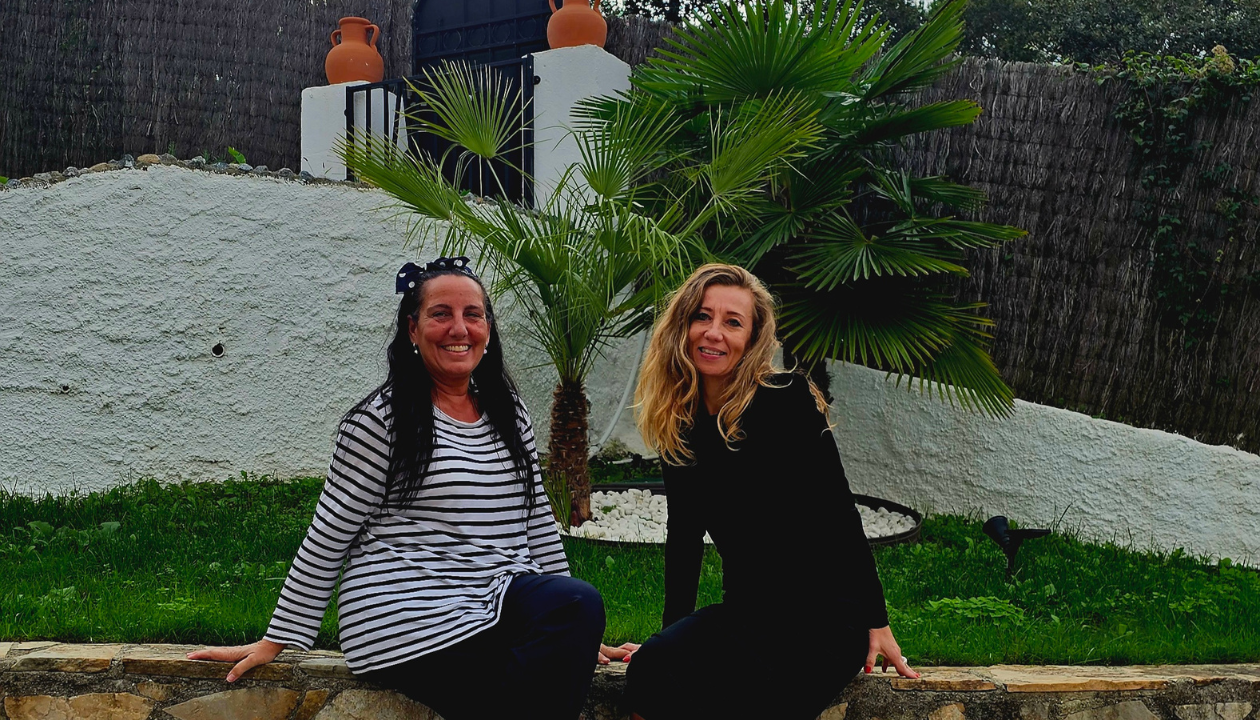
2. Why Business Spanish Matters
As an NLP Master Practitioner and Mindfulness Architect, Jeanette often works with diverse groups and individuals. Her success in these areas hinges on clear communication skills and the ability to connect with clients from varying backgrounds.

Mastering business Spanish not only expands her client base but also allows her to offer her services more effectively in Spanish-speaking markets. She considered attending a Spanish school or taking private classes but ultimately chose an immersive approach.
During her homestay, we focused on:
- Formal communication: Writing business emails, preparing reports, and drafting professional proposals—essential skills for professionals needing a strong Spanish level in the workplace.
- Presentations and meetings: Practicing role-plays to simulate client interactions, workshops, and negotiations, much like the exercises done in evening classes tailored for business professionals.
- Industry-specific vocabulary: Tailoring lessons to include NLP, mindfulness, and coaching terminology in Spanish, similar to the focus of intensive Spanish courses designed for specific professional needs.

3. Reconnecting with Rumba and Samba
One of the heartwarming highlights of Jeanette’s return was reuniting with Rumba and Samba, my two golden retrievers.
She had met them years ago in London, and it was love at first sight back then. When she arrived in Dosrius, both dogs recognized her voice instantly, greeting her with wagging tails and boundless enthusiasm.
This special bond added a layer of warmth and comfort to her stay, like she was visiting old friends rather than coming to a new place.
Being surrounded by familiar faces, including my dogs, made her transition smoother, just as fellow students often feel when joining a Spanish language school and meeting new people in a welcoming environment.
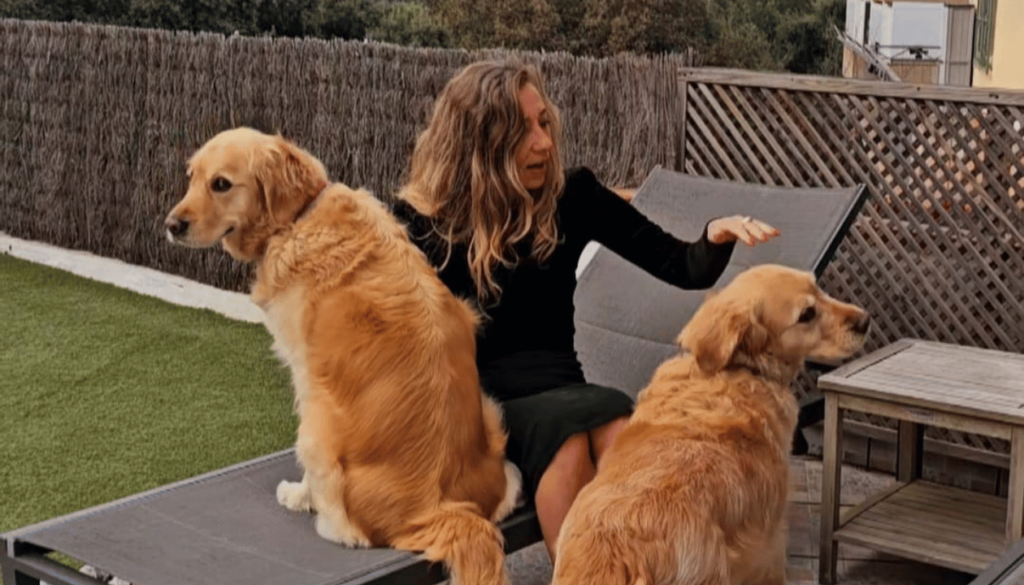
4. Mornings of Focused Study
Jeanette’s immersion program prioritized intensive morning lessons. Over a relaxed breakfast and coffee, we delved into advanced grammar and vocabulary, emphasizing real-world applications:
- Business Scenarios: We simulated phone calls with clients, presentations to prospective partners, and team meetings to boost her confidence in formal Spanish, essential for professionals attending intensive courses.
- Interactive Exercises: From reading authentic case studies to discussing Spanish news articles, every lesson was rooted in practical use rather than rote memorization, similar to how experienced teachers structure their classes.
- NLP & Mindfulness Integration: Because of Jeanette’s expertise, we integrated mindfulness exercises and NLP principles into the language lessons, making them both informative and personally meaningful, much like the holistic approach taken in Spanish learning programs.
These structured lessons laid the foundation for the rest of the day, where she could practice Spanish in more spontaneous settings.
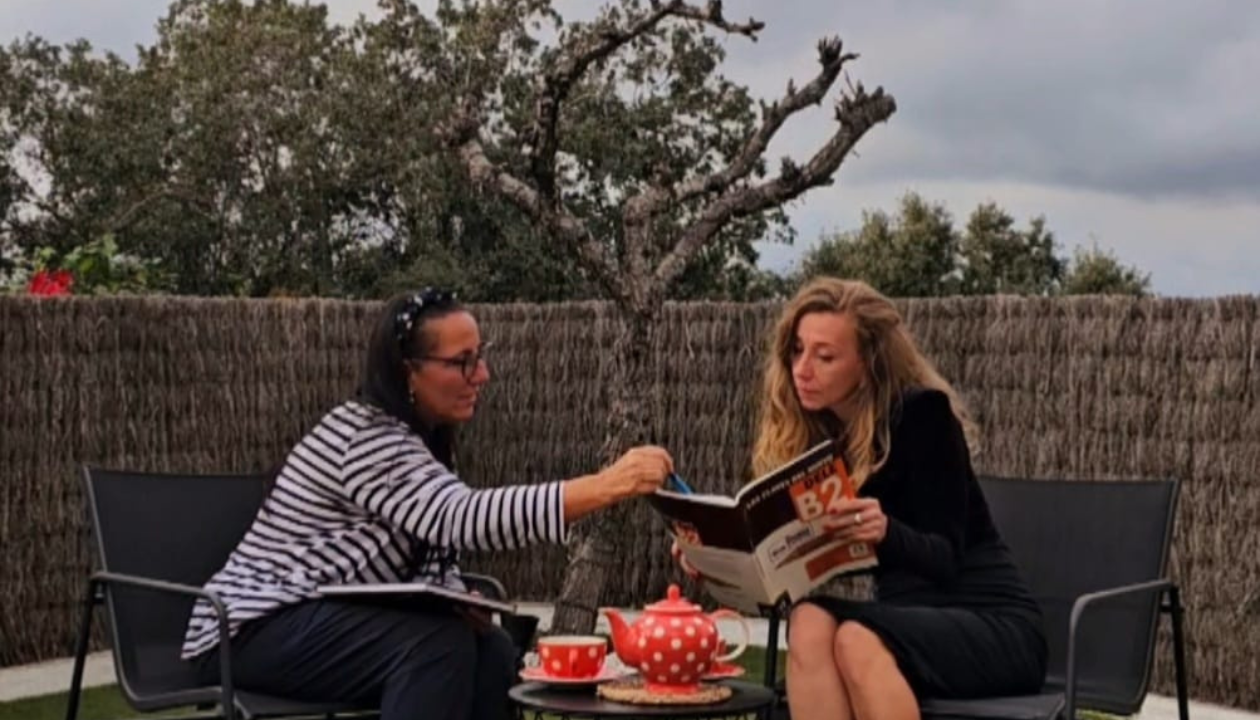
5. Afternoons of Real-World Application
After morning sessions, it was time to put theory into action. We used Dosrius and its surroundings as our language playground:
- Cultural Sites and Nature Walks: The Maresme Coast is rich in scenic trails and cultural landmarks, offering ample chances to discuss history, architecture, and Spanish culture. Exploring places within walking distance also allowed her to absorb more than just the language—it gave her a deeper appreciation of the region.
- Networking Practice: When we encountered business owners or neighbors, we seized the opportunity for Jeanette to network, exchange ideas, and discuss her own professional services in Spanish. This hands-on approach, similar to the learning experience at a school in Barcelona, made it easier for her to integrate new vocabulary naturally.
This seamless blend of study and real-life immersion helped her grasp the subtleties of pronunciation, local expressions, and cultural etiquette far more quickly than traditional classroom methods alone. The interactive learning process reflected the dynamic nature of Spanish courses in Barcelona, where lessons extend beyond textbooks into real-world practice.
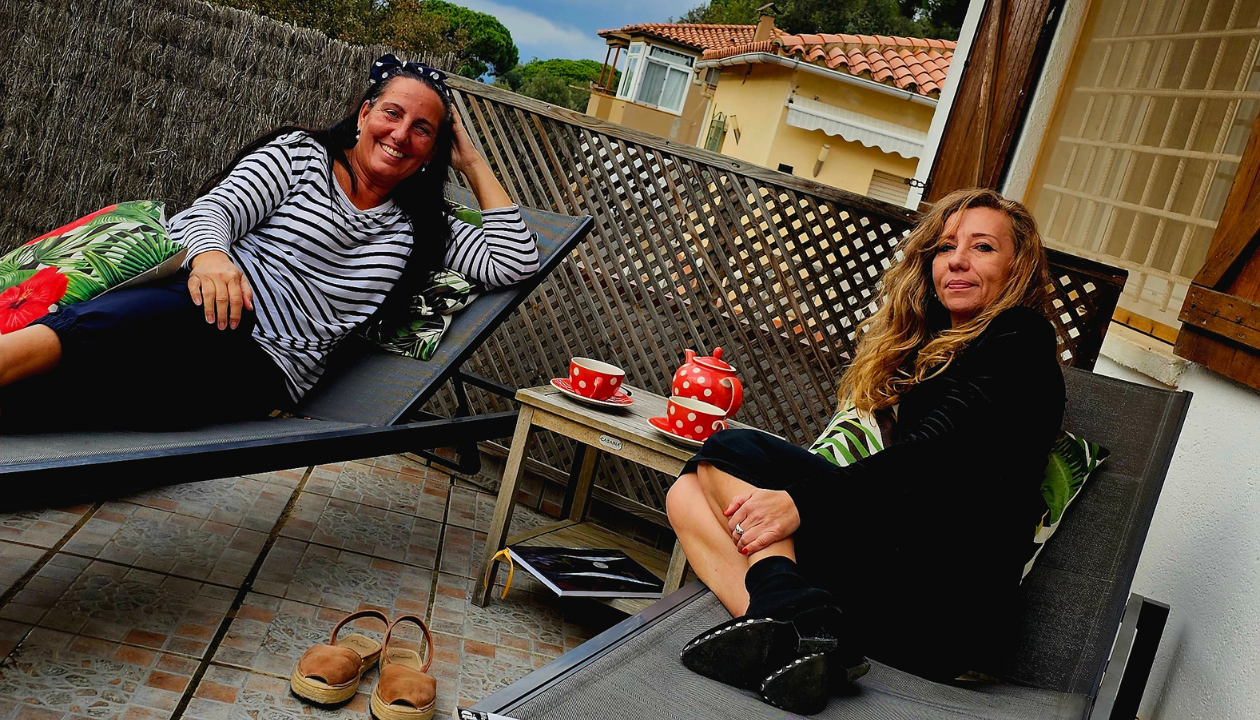
6. The Surprise Keepsake: Falling in Love with Romsabi’s Painting
Art has a way of capturing the soul of a place, and Jeanette experienced this firsthand when she encountered a painting by Romsabi, my father’s artistic alter ego.
The vibrant colors and unique composition spoke to her immediately. She decided to purchase the piece as a treasured souvenir, a tangible reminder of her time in Dosrius. Much like students staying in a shared apartment or student residence during their studies, she wanted something that would forever connect her to this immersive experience.
Now, each glance at the painting back in Valencia transports her back to the scenic vistas, engaging lessons, and deep conversations that defined her homestay. It reminds her of the personal growth she experienced, much like international students who travel to Barcelona learn Spanish while exploring a new culture.
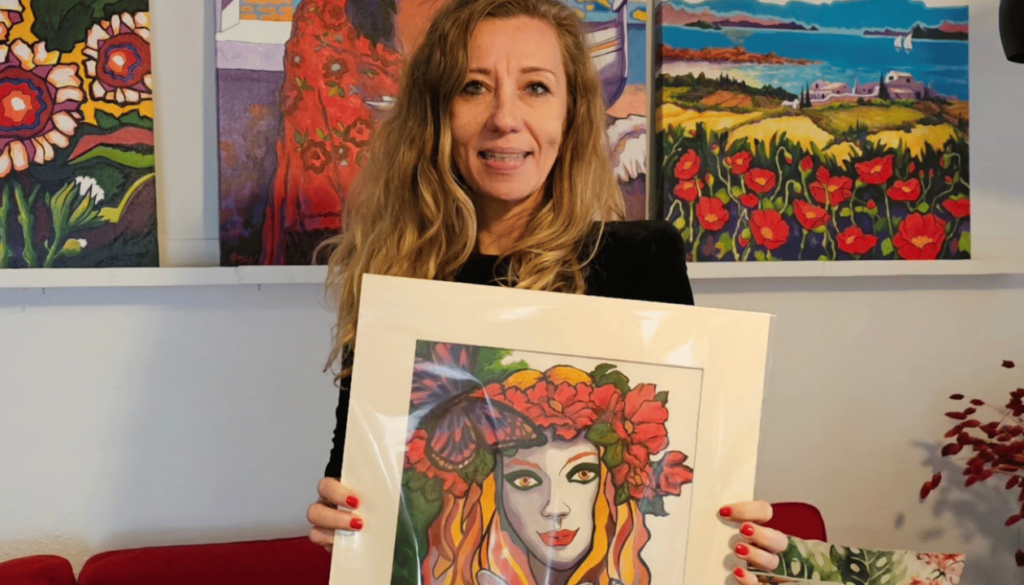
7. Personal Growth and Professional Edge
Beyond language improvement, Jeanette’s stay represented a pivotal step in her professional journey. The immersive lessons and genuine interactions helped her:
- Enhance Confidence: She gained the self-assurance to lead Spanish-speaking workshops and collaborate with international teams.
- Strengthen Cultural Awareness: By living with a local host and interacting with neighbors, she developed a deeper understanding of Spanish customs—insights that go a long way in professional environments.
- Expand Her Network: Through friendly chats and community engagement, she widened her circle, setting the stage for future collaborations and potential projects.
8. A Community Beyond the Classroom
What truly sets homestay immersion apart is the sense of community. Jeanette didn’t just come for lessons; she integrated into the family setting, shared meals, and participated in daily routines, much like international students adjusting to a new environment.
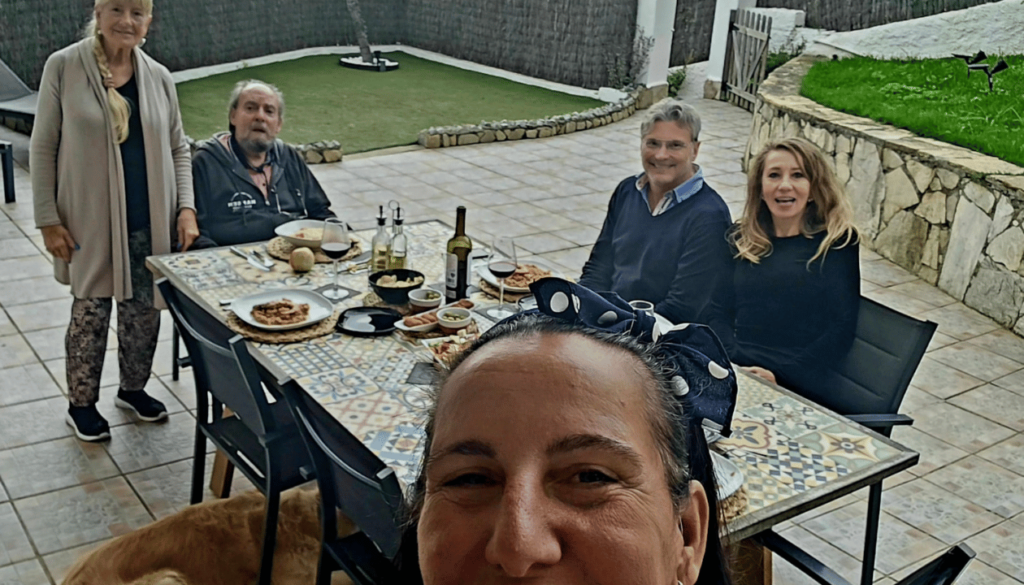
The environment was relaxed, supportive, and open—an ideal backdrop for language exploration and cultural exchange, similar to what students experience in a student residence while studying abroad.
From swapping stories about her life in Hungary to discussing the nuances of Valencian culture, Jeanette forged genuine connections with those around her, making her immersion experience even more memorable, just as those who learn Spanish in Barcelona build lasting relationships through shared experiences.

Looking Ahead: A Bright Future in Spain
By the end of her homestay, Jeanette felt a renewed enthusiasm for her life in Valencia. She left Dosrius with a stronger command of the Spanish language—both for business and everyday interactions—and a painting that will always remind her of this transformative week.
For anyone considering an immersive experience, Jeanette’s journey underscores the power of a focused, hands-on approach to learning Spanish.
Whether you’re looking to advance in your career, find your footing in a Spanish-speaking country, or simply enjoy a culturally rich vacation, our SHIP program offers a welcoming space to truly live the language.
Ready to Boost Your Business Spanish?
If Jeanette’s story resonates with you—whether you’re over 40, a busy professional, or simply seeking a deeper cultural experience—our Spanish Homestay Immersion Program (SHIP) in Barcelona, Dosrius could be your perfect fit.
Our Spanish teachers focus on a tailored, immersive approach, ensuring that every student experiences both structured lessons and real-life practice. Whether you are new to the language or have years of experience, our program provides an excellent opportunity for teaching Spanish in a practical, engaging way.
Curious to learn more? Reach out to explore how our program can help you achieve your Spanish goals, just as it did for Jeanette. We can’t wait to welcome you, your ambitions, and maybe even introduce you to Rumba and Samba as well! ¡Te esperamos en Barcelona, Dosrius!

A Heartfelt Recommendation
Jeanette described her immersion program as both valuable and fun, wholeheartedly recommending it to anyone looking to deepen their Spanish skills. Whether you’re already living in Spain or considering a future move, an immersive homestay can help you gain the fluency and cultural understanding you need to thrive.
FAQs
Does Spain offer free Spanish classes?
Yes, some local governments and community centers offer free Spanish courses, especially for immigrants. However, these classes are often basic and may have limited availability. Private schools and immersion programs provide a more structured and intensive learning experience.
Can I study Spanish in Spain for free?
While free courses exist, they are usually beginner-level and have limited spots. To gain fluency, most students opt for paid classes or immersive experiences like homestay programs, which provide real-world practice and cultural exposure.
Should tourists speak Spanish in Barcelona?
While many people in Barcelona speak English, learning and using basic Spanish (or Catalan) is appreciated by locals. Even simple greetings and polite phrases can enhance your experience and show respect for the Spanish culture.
Is it OK to speak Spanish in Barcelona?
Yes, Spanish is widely spoken in Barcelona alongside Catalan, the co-official language. Locals understand both, and speaking Spanish is completely acceptable in daily interactions.
What is Spanish called in Barcelona?
In Barcelona, Spanish is referred to as Castellano to distinguish it from Catalan, the region’s other official language. Both languages coexist, and residents are generally bilingual. Many students choose to Barcelona learn Spanish while also gaining exposure to Catalan.
Is it OK to speak English in Barcelona?
Yes, many people in Barcelona, especially in tourist areas, speak English. However, not everyone is fluent, so knowing some basic Spanish or Catalan can be helpful and appreciated.

